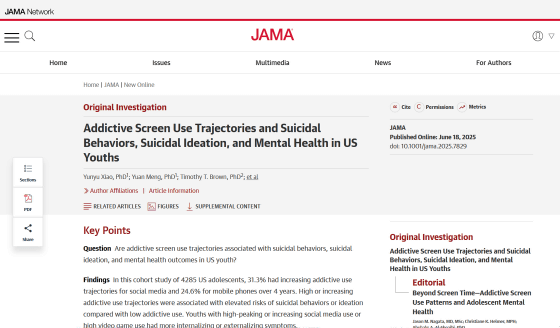Teens addicted to social media and smartphones are at higher risk of suicidal behavior

It has been pointed out that excessive use of smartphones and social media has a negative impact on the mental health of young people, and various countries are taking measures, such as
Addictive Screen Use Trajectories and Suicidal Behaviors, Suicidal Ideation, and Mental Health in US Youths | Media and Youth | JAMA | JAMA Network
https://jamanetwork.com/journals/jama/fullarticle/2835481

Addictive Use of Social Media, Not Total Time, Associated with Youth Mental Health | Columbia University Irving Medical Center
https://www.cuimc.columbia.edu/news/addictive-use-social-media-not-total-time-associated-youth-mental-health
Teenagers who report addictive use of screens at greater risk of suicidal behavior, study shows | Children's health | The Guardian
https://www.theguardian.com/society/2025/jun/18/teenagers-social-media-mobile-phones-video-games-mental-health
The relationship between children's and adolescents' use of social media, games, and smartphones and their mental health has been pointed out for some time. However, most studies examining these associations have focused on 'screen time,' or the total amount of time spent using the device, and little attention has been paid to how the use of social media and smartphones themselves, or the nature of their use, changes over time.
A research team from Columbia University's Vagelos School of Medicine and Weill Cornell Medicine conducted a study looking at children's 'additive use' of social media, smartphones and video games.
The study followed 4,285 adolescents living in the US about their social media, smartphone and video game use, as well as their mental health. The children were aged 8-10 at the start of the study, and their screen time and mental health were monitored over a four-year period.
Rather than simply measuring screen time, the team assessed participants' 'additive use,' using machine learning to group participants based on whether their technology was interfering with their schoolwork, exercise or other activities, and whether they felt cravings or distress when away from screens.

The study found that about half of the children reported being highly addictive about smartphones from the start of the study, and 24.6% of the children's addictive smartphone use increased over the four-year follow-up period.
For social media, about 40% of children in total showed addictive use or a tendency toward increasing addiction. On the other hand, for video games, more than 40% showed high addiction, but unlike social media and smartphones, no group was identified that clearly became more addictive over time, and children were divided into those who were highly addictive and those who were not.
When analyzed alongside suicidal behaviors, including suicidal ideation and preparation, and other mental health issues, children with high or increasing social media and smartphone addiction were found to be two to three times more likely to have suicidal behaviors than children with low addiction. Children with high video game addiction were also significantly more likely to report suicidal behaviors and symptoms of anxiety, depression, aggression, and rule breaking than children with low addiction.
In contrast, overall time spent on social media, smartphones or video games was not associated with suicidal behaviour or mental health risk, suggesting that it's not screen time that matters, but whether that use leads to addictive tendencies - obsessions, distress or a lack of control.

'While national surveys and previous studies have documented increases in screen use, ours is the first to specifically map the long-term trajectory of addictive use, providing new insights into when and for whom risk emerges,' said Yunyu Xiao , lead author of the study and associate professor of health sciences and psychiatry at Weill Cornell Medicine. 'Policy efforts should move away from general limits on screen time and instead focus on identifying and addressing addictive patterns of screen use.'
Related Posts:
in Web Service, Science, Smartphone, Posted by log1h_ik







